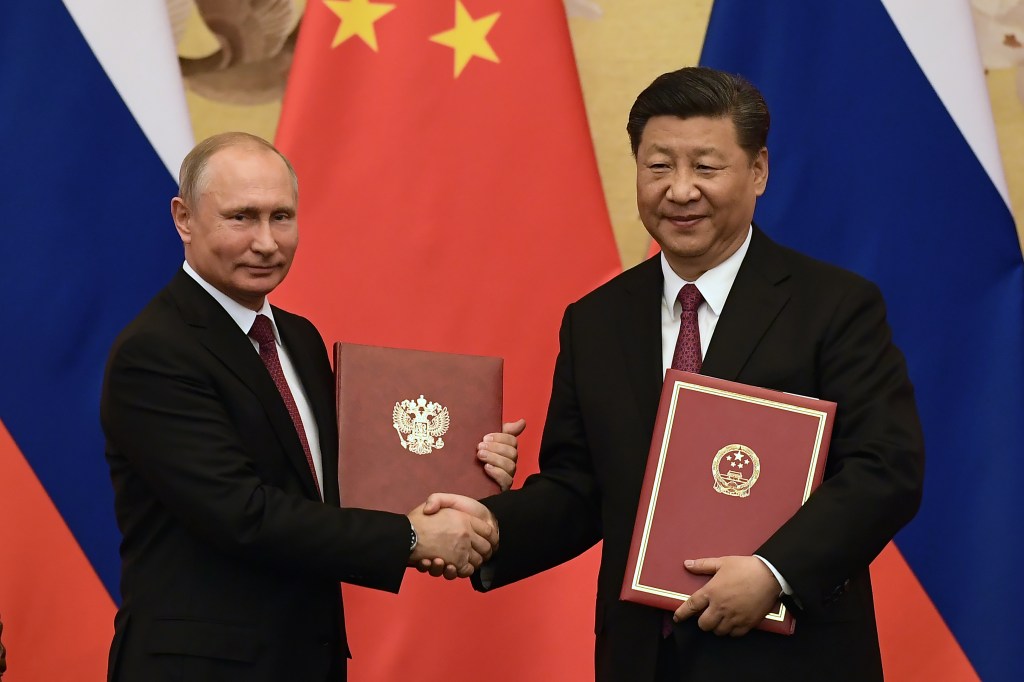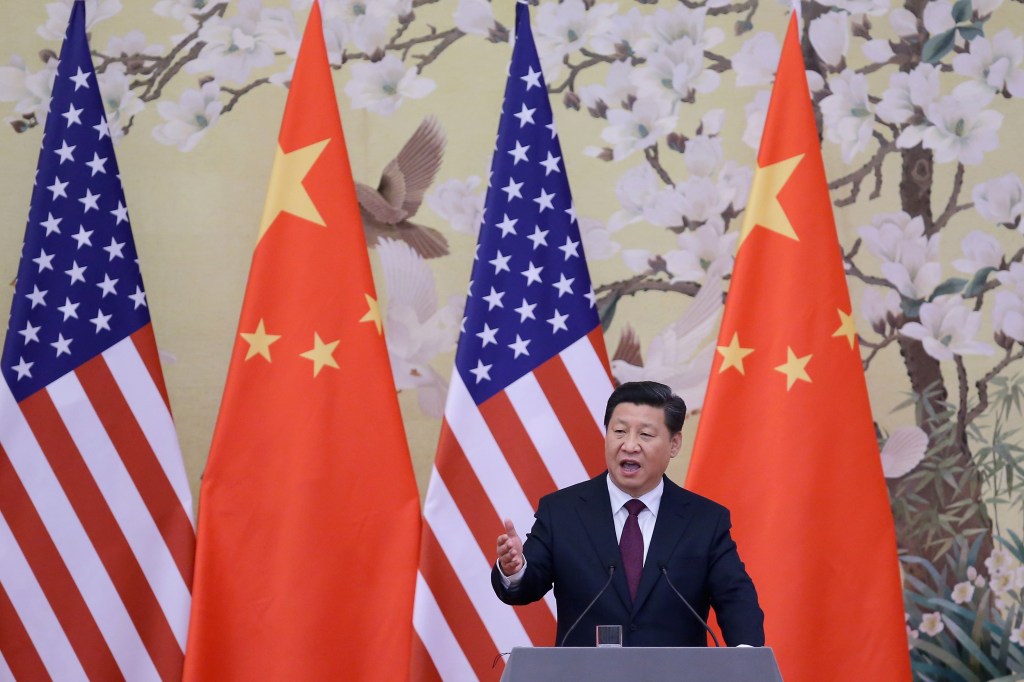
Foreign companies doing business with China that have endured heightened risks this year from geopolitical tension and Covid-19 pandemic fallout aren’t likely to get much of a break after the Communist Party’s much-awaited party congress in October, a prominent China scholar said in an interview today.
“We’re in for a period of increased tension,” said Bates Gill, a long-time China scholar recently named executive director of the Center for China Analysis at the New York-based Asia Society Policy Institute in New York.
His advice to international businesses and investors: “Proceed with due caution owing to the political and geostrategic risks that will likely increase rather than diminish.”
Gill, the author or editor of nine books on China- and Asia-related topics, including this year’s Daring to Struggle: China’s Global Ambitions under Xi Jinping, expects Communist Party Secretary Xi Jinping to continue what he sees as a risk-taking, nationalist approach to the country’s foreign relations.
“Coming out of the party congress will be more of the same, and even possibly a further doubling down in the way that this leadership wants to deal with the outside world,” Gill said. “At least near term – three to five years, that means a further increase in the likelihood of contestation and conflict between China and some of its key neighbors, not least the United States.”
Gill was previously Freeman Chair in China Studies at the Center for Strategic and International Studies, and founding director of the Center for Northeast Asian Policy Studies at the Brookings Institution.
Edited excerpts follow.
Flannery: Where do U.S. relations with China stand after China Foreign Minister Wang Yi’s visit to New York and talks here last week?
Gill: U.S.- China relations stand pretty much where they were a week ago, meaning that the two sides are still at loggerheads and are still at a very early stage in the negotiation process.
The immediate event in front of them for the bilateral relationship is the anticipated summit between President Biden and Xi Jinping in November. They’re in the earliest stages of trying to work out what exactly what that meeting is going to try to accomplish. And with the huge intervening variable of the 20th party congress in-between, I suspect that there may not be all that much bandwidth or flexibility on the Chinese side to get the negotiation process advanced.
The big obstacles are obviously the domestic political situations in both countries, which I think makes it difficult for either side to accommodate the other and try to come up with a formula that, maybe, could set a floor under the relationship or establish a somewhat more moderate tone for the two sides. But that wording is going be difficult to come up with. They’re still in the earliest days of trying to actually work out what that might be.
Flannery: What are your own expectations for what will come out of the party congress?
Gill: I think we’re going be seeing more of the same in terms of strategy for China’s external relationships. The congress, I suspect, is going to be all about reinforcing and celebrating the new mandate which Xi Jinping is likely to get. His control over the propaganda organs will put him in an even stronger, more powerful and more confident position, at least from an outward-facing point of view. It will be up to analysts and the Pekingologists to try and look for cracks in that façade and speculate on one appointment or another that maybe indicates that Xi is not as powerful as the propaganda apparatus would have us believe.
Flannery: How would you say Xi’s leadership style and substance have changed over time, and what should we expect from him in the future? You explore some elements of that in “Daring to Struggle.”
Gill: If anything, what we’ve seeing is a trajectory of increasing confidence, increasing risk-taking, and increasingly nationalistic positions. I think they are born of two things. One is an outward-facing confidence in his position and the ostensible support he enjoys within the party, which then lends him the authority and mandate and resources to take on more risky, assertive, and nationalistic positions.

Second, that is born of a calculation he and his supporters have reached. While it’s understood that this more assertive, nationalistic, confident posture clearly has risks and is getting more difficult, they are seen as less risky than not taking this approach to their international relations. The relationship with the United States has not gone well; almost every major relationship that China has internationally has not improved over the last 10 years — it has actually gotten worse, save perhaps the relationship with Russia, which has clearly deepened, but which also carries with it enormous risks.
I conclude, then, that what we’ll see coming out of the party congress will be more of the same, and even possibly a further doubling down in the way that this leadership wants to deal with the outside world. At least near term – three to five years, that means a further increase in the likelihood of contestation and conflict between China and some of its key neighbors, not least the United States.
Flannery: What would you say are some of the takeaways in your book for foreign companies doing business with China?
Gill: Proceed with great caution. I think that not only because of the macroeconomic indicators and potential economic challenges that China faces, there’s going to be increasing risk politically inside China as to how foreign investors get treated. I also think there will be third party risk. As companies that stay engaged with China and the overall strategic relationship with it continues to move in a troubled direction, companies can (more easily) run afoul of political pressure to diminish or moderate their engagement with China, or could possibly run afoul of a range of economic punitive measures that are out there (from their own governments).
I suspect sanctions and other blacklisting-type activities are going remain in place and might get even more onerous. Proceed with due caution owing to the political and geostrategic risks that will likely increase rather than diminish. I think we’re in for a period of increased tension.
Flannery: The U.S. and China are maneuvering for influence and friendships across the Pacific and Asia. Where do you see that going from here?
Gill: We are entering a new era of great power competition in this part of the world, and probably a competition that’s not particularly welcome for many of the countries in the region, particularly the smaller Pacific island nations. Only some are going be all that adept at trying to play the kind of diplomatic game where they can extract maximum benefit from both. Some will be effective at that; others perhaps less.
But (the maneuvering) is definitely going to increase. Both the United States and China have signaled in their own ways that this region is going to be increasingly important.
I do question the commitment the United States can mobilize— the political, economic, influence and engagement with many countries in the region— and do so in a way that can keep up with what has been a quite substantial amount of investment and effort on China’s part.
We’ll just have to wait and see. It is critical that the United States and its partners demonstrate far more engagement, open up new embassies, for example, and introduce more on the way of political leadership, summit meetings and economic investment.
But at the end of the day, China often has more tools than the United States. Washington simply cannot exercise the same of kind of government-directed economic investment. At the end of the day, that’s going to be a decision (for the U.S.) mostly taken by the private sector. The U.S. government can put forward development assistance and some infrastructure support, the real money would have to be generated out of the private sector. And that’s just more difficult for the United States. The U.S. government has a much harder time than China directing private investment towards these sorts of regions. In many ways, that means, in this region at least, our influence will arise from other factors.
See related posts:
Taxes, Inequality And Unemployment Will Weigh On China After Party Congress
U.S. Cancer Moonshot Needs Stronger Int’l Effort To Success — Kevin Rudd
Pandemic’s Impact On China Economy Is Only Short Term, Ambassador Says
@rflannerychina